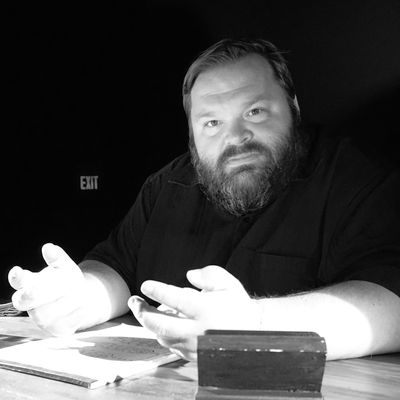
Yes This Man, the title of Mike Daisey’s slender new monologue, has a kind of “Ecce Homo” quality to it, and Daisey, declaredly, plays his own Pilate here. As a white male monologist, monologuing about the plight of women, he tries and convicts himself of “the original, Aristotelian version of mansplaining”: The notion of Mike Daisey’s telling women (and men) what’s wrong with the way all societies traditionally and persistently treat women is de facto abominable. (His original title, Yes All Women, was altered after Twitter collectively objected to Daisey’s appropriation of the meme.) How will he pull it off? Offer himself up for dude-ifixion, of course. So we brace for painful confessions and tortured self-critique, from a guy known for both.
And we get it. But only kind of. Daisey’s “not a fucking journalist,” he reminds us again, and although it’s fashionable to call him a “fabulist,” the tales he spins can’t really be classified as fables. He’s a brilliant trickster, a close-magician with superb sleight of hand, more Taliesin than Aesop. His furies are bright and stark, incandescently theatrical. His phrasings and delivery are ensorcelling and incantatory — but his arguments and conclusions dance like sand on a drumhead. Pinning him down — finding the Mike Daisey in this monologue about Mike Daisey’s relationship with women — would involve physics unavailable to three-dimensional meat-apes like you and me. After all, this is a man who can prostrate himself before the docu-pope Ira Glass one moment and dispute the very notion of objective reality the next. He’s an escape artist.
Watching him escape his own snare and vanish from his own monologue is half the pleasure of Yes This Man. (The show, performed on June 25 for one night, will return in late July in a different form, Daisey says.) Daisey sets his brief gender Gethsemane in the Yaffa Cafe, where he meets a feminist academic and confesses that he has become “sexist against men,” out of disgust with others of his kind and with himself. He introduces an amusing image: Star Trek’s Captain Kirk putting on his boots after a romp with a sexy alien. (The act was never shown on TV, of course, but Daisey points out that the initial clinch was always shown right before the throw to commercial; when viewers returned to the Enterprise, Kirk was pulling on his Starfleet boots, indicating that space-seed had been sown.) Then he tells a story that must’ve shocked the one or two audience members who didn’t grow up “theater kids”: He kissed a boy once, at a cast party, in college. In his best moment of the night, Daisey talks about how he quietly closed that door, sensing that leaving it open would be like propping open an airlock on a spaceship: Eventually, his whole life might be sucked out into a fathomless void.
But what, precisely, does this have to do with This Man’s relationship with women? Or All Men’s relationship with All Women? There’s a cottony, nebulous expanse of monologue between that initial revelation and his final one: that he and his wife, Jean-Michele Gregory, though happily (and presumably monogamously) married, live in separate domiciles and “date.” This is presented as a sort of gentle lesson in the distance between the genders — a distance Daisey acknowledges and marvels at, but does not interrogate with any vigor. The new, post-factual Daisey doesn’t do a lot of “reporting” (because he is “not a fucking journalist”), and this show isn’t chockablock with women’s stories of the #YesAllWomen genus, nor with men’s stories, nor with Daisey’s stories. What he’s left with is what we’re all left with: that fathomless void, artfully punctuated. This feels like a work in progress, and I’m looking forward to the next iteration.
Yes This Man played at the Public Theater, and a revised version of the production will return in late July.




